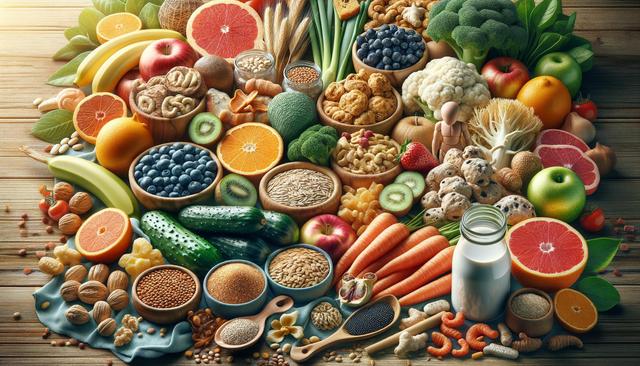Exploring the Foods That May Support Immune Health
Our guide on Immunity Boosting Foods for Seniors helps you thrive. Discover the best immunity boosting foods for seniors, including nutrient-rich options & essential vitamins. Support a strong immune system and overall well-being through smart nutrition. Consult your doctor for personalized advice.

Understanding the Role of Nutrition in Immune Health
A strong immune system is essential for maintaining health and vitality, particularly in older adults. As we age, immune function can naturally decline, making it even more important to adopt dietary habits that support the body’s defenses. Nutrients such as vitamins A, C, D, E, and minerals like zinc and selenium play a vital role in immune response. These elements help regulate immune cells and contribute to the body’s ability to fight off infections and recover from illness. Incorporating a variety of whole foods that contain these nutrients is a practical and effective way to support immune health through diet.
For seniors, selecting nutrient-dense foods that are easy to prepare and digest can make a noticeable difference. Rather than relying on supplements alone, consuming these nutrients through balanced meals allows for better absorption and additional benefits from fiber and antioxidants. Planning meals around whole grains, lean proteins, fruits, and vegetables ensures the body gets the support it needs to stay resilient.
Fruits and Vegetables That Support Immunity
Fruits and vegetables are rich in vitamins, minerals, and antioxidants that help strengthen the immune system. Brightly colored produce often contains the phytochemicals and nutrients necessary for optimal immune function. For instance, citrus fruits are high in vitamin C, a well-known antioxidant that contributes to the production of white blood cells, which are key to fighting infections.
Some top choices to include in your diet are:
- Oranges, grapefruits, and lemons – rich in vitamin C
- Spinach and kale – loaded with vitamin A and fiber
- Red bell peppers – contain more vitamin C than many fruits
- Carrots and sweet potatoes – high in beta-carotene
- Blueberries and strawberries – packed with antioxidants
Including a variety of these options daily can help provide consistent nutritional support. Fresh, frozen, or steamed vegetables all retain much of their nutrient value, making them versatile options for meals and snacks.
Protein-Rich Foods for Immune Strength
Protein is essential for building and repairing tissues, including those involved in immune responses. Amino acids, the building blocks of protein, are required for the creation of immune cells and antibodies. Seniors should aim to include quality protein sources in each meal to maintain muscle health and support immune resilience.
Some protein-rich foods that offer additional immune-boosting benefits include:
- Lean poultry and fish – provide zinc and B vitamins
- Eggs – a complete protein source with vitamin D
- Beans and lentils – rich in fiber, iron, and plant-based protein
- Nuts and seeds – offer healthy fats, vitamin E, and selenium
- Low-fat dairy or fortified plant-based alternatives – good sources of protein and vitamin D
Combining these with vegetables and whole grains creates balanced meals that fuel the body and strengthen immune defenses. For those with dietary restrictions, plant-based options can be an excellent substitute for animal proteins.
Whole Grains and Healthy Fats to Support Immune Balance
Whole grains and healthy fats are often overlooked but are important components of an immune-supportive diet. Whole grains provide fiber, B vitamins, and trace minerals that assist in maintaining gut health—a critical factor in immune regulation. A healthy gut microbiome helps modulate inflammation and supports efficient nutrient absorption.
Recommended whole grains include:
- Oats
- Brown rice
- Quinoa
- Whole wheat bread or pasta
Incorporating healthy fats is equally important. Omega-3 fatty acids, found in foods like fatty fish, flaxseeds, and walnuts, have anti-inflammatory properties that can help regulate immune function. Extra virgin olive oil is another good choice, as it contains antioxidants and monounsaturated fats.
Balanced meals that combine whole grains, proteins, vegetables, and healthy fats can help sustain energy levels and immune health without being overly complicated or restrictive.
Hydration and Gut Health as Immune Allies
Hydration and gut health are foundational to overall well-being and have a direct impact on immune health. Water helps carry nutrients to cells and flush toxins from the body, while adequate hydration also supports skin and mucosal barriers—our first line of defense against pathogens.
In addition to drinking water, other hydrating options include:
- Herbal teas
- Low-sodium broths
- Fruits and vegetables with high water content (e.g., cucumbers, watermelon)
Gut health is another key area to focus on. A significant portion of the immune system resides in the gut, where beneficial bacteria help regulate immune responses. Consuming probiotic-rich foods can support a healthy balance of gut flora. Include items like:
- Yogurt with live cultures
- Kefir
- Fermented vegetables such as sauerkraut or kimchi
- Miso and tempeh
Pairing these with prebiotic foods—like bananas, garlic, and whole oats—can enhance their effectiveness. A healthy gut not only improves digestion but also helps the body mount a more effective immune response.
Conclusion: Building Immune Resilience Through Nutrition
For seniors aiming to enhance their immune health, a thoughtful and nutrient-rich diet is a practical and effective approach. By focusing on a wide variety of whole foods—including fruits and vegetables, lean proteins, whole grains, and healthy fats—older adults can support immune function naturally. Hydration and gut health also play crucial roles in promoting overall wellness and immune resilience. While dietary changes can have a positive impact, it’s important to consult with a healthcare professional to ensure nutritional choices align with individual health needs and conditions. With consistent, balanced nutrition, seniors can feel more empowered in supporting their immune system and enjoying a vibrant, active lifestyle.